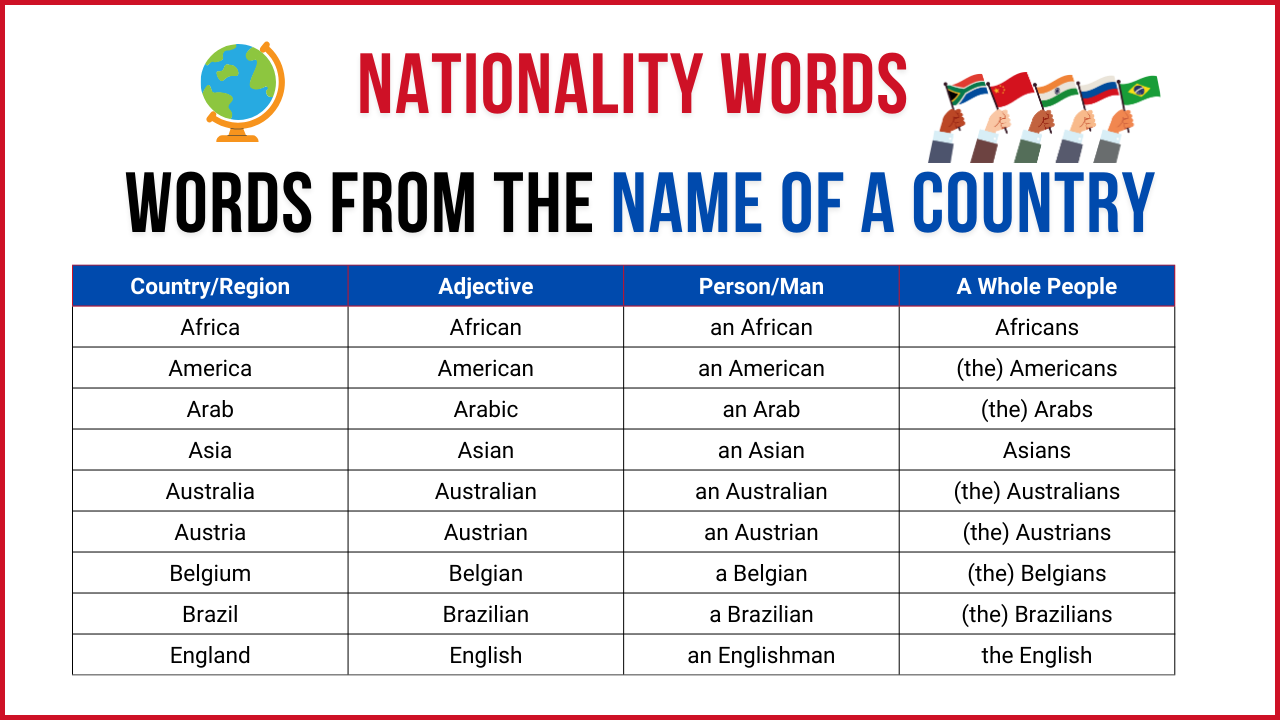1. We form nationality words from the name of a country: Italy, Italian, France, French, Japan, Japanese. We can use them in different ways.
NOTE Some of these words do not refer to a political nation, e.g., European, Jewish.
a. As an adjective
- Italian food, a French town, Japanese technology, and a Russian novel.
b As the name of a language
- I learnt Italian at evening classes.
- Do you speak Russian?
- I don’t know any Greek.
c. Referring to a specific person or group of people
- Debbie is married to an Italian.
- There are some Russians staying at the hotel.
- The Japanese were looking round the cathedral.
d. Referring to a whole people
- Italians are passionate about football.
- The French are proud of their language.
These expressions take a plural verb.
We can also say, e.g. Italian people, Russian people.
2. There are different kinds of nationality words.
a. Many end in an: Italian, American, Mexican. We can add s to form a plural noun.
- Three Italians are doing the course.
- (The) Americans think they can see Europe in a week.
NOTE
- a To this group also belong Greek, Czech, Thai, Arab, and words ending in i, e.g., Pakistani, Israeli.
- The Greeks invented democracy.
- b The language of the Arabs is Arabic.
b. Some end in ese: Chinese, Portuguese. We cannot add s.
- Several Chinese (people) were waiting in the queue.
When we talk about a whole people, we must use the or people.
- The Chinese welcome/Chinese people welcome western tourists.
c. With some words, the adjective is different from the noun.
- She’s Danish./She’s a Dane.
- I like Danish people./I like (the) Danes.
Also: Swedish/a Swede, Finnish/a Finn, Polish/a Pole, Spanish/a Spaniard, Turkish/a Turk, Jewish/a Jew.
NOTE
From Britain we form the adjective British.
- There are a lot of British people in this part of Spain.
The nouns Brit and Briton are not very usual in spoken British English.
- There are a lot of Brits/Britons in this part of Spain.
This usage is rather journalistic. Brit is informal. The Americans say Britisher. For the whole people, we say the British.
- The British prefer houses to flats.
d. With some words, the noun has the suffix man.
- He’s English. /He’s an Englishman.
- Englishmen are reserved.
Also: Welsh/a Welshman, Irish/an Irishman, French/a Frenchman, Dutch/a Dutchman.
For a whole people, we can use the adjective with the or people.
- The English are/English people are reserved.
Here is an overview of nationality words:
| Country/Region | Adjective | Person/Man | A Whole People |
|---|---|---|---|
| Africa | African | an African | Africans |
| America | American | an American | (the) Americans |
| Arab | Arabic | an Arab | (the) Arabs |
| Asia | Asian | an Asian | Asians |
| Australia | Australian | an Australian | (the) Australians |
| Austria | Austrian | an Austrian | (the) Austrians |
| Belgium | Belgian | a Belgian | (the) Belgians |
| Brazil | Brazilian | a Brazilian | (the) Brazilians |
| Britain | British | – | (the) British |
| China | Chinese | a Chinese | the Chinese |
| Czech Republic | Czech | a Czech | (the) Czechs |
| Denmark | Danish | a Dane | (the) Danes |
| England | English | an Englishman | the English |
| Europe | European | a European | Europeans |
| Finland | Finnish | a Finn | (the) Finns |
| France | French | a Frenchman | the French |
| Germany | German | a German | (the) Germans |
| Greece | Greek | a Greek | (the) Greeks |
| Holland | Dutch | a Dutchman | the Dutch |
| Hungary | Hungarian | a Hungarian | (the) Hungarians |
| India | Indian | an Indian | (the) Indians |
| Ireland | Irish | an Irishman | the Irish |
| Israel | Israeli | an Israeli | (the) Israelis |
| Italy | Italian | an Italian | (the) Italians |
| Japan | Japanese | a Japanese | the Japanese |
| Jewish | Jewish | a Jew | (the) Jews |
| Mexico | Mexican | a Mexican | (the) Mexicans |
| Norway | Norwegian | a Norwegian | (the) Norwegians |
| Pakistan | Pakistani | a Pakistani | (the) Pakistanis |
| Poland | Polish | a Pole | (the) Poles |
| Portugal | Portuguese | a Portuguese | the Portuguese |
| Russia | Russian | a Russian | (the) Russians |
| Scotland | Scottish | a Scotsman | (the) Scots |
| Spain | Spanish | a Spaniard | the Spanish |
| Sweden | Swedish | a Swede | (the) Swedes |
| Switzerland | Swiss | a Swiss | the Swiss |
| Thailand | Thai | a Thai | (the) Thais |
| Turkey | Turkish | a Turk | (the) Turks |
| Wales | Welsh | a Welshman | the Welsh |

